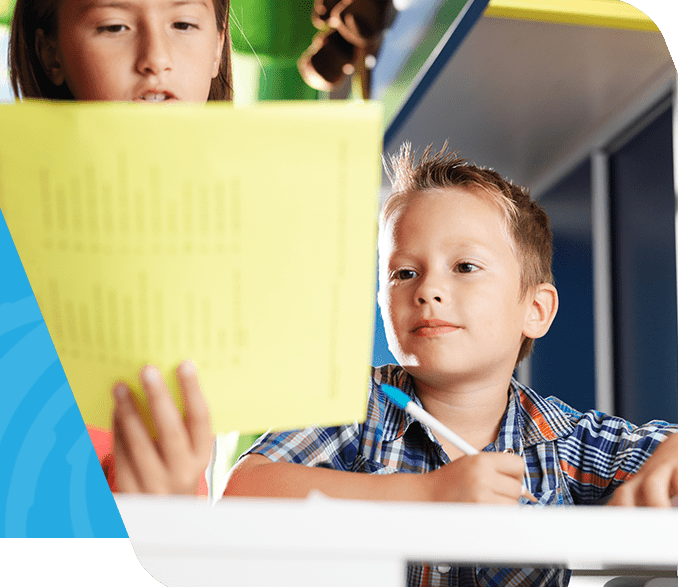24 Jul Understanding the Role of a Certified Academic Language Therapist
Springfield Center for Dyslexia and Learning, a 501(c)3 educational not-for-profit, is dedicated to supporting individuals with significant reading, spelling, and writing difficulties, including dyslexia. Our mission is to unlock the potential of each learner through personalized, evidence-based interventions provided by Certified Academic Language Therapists (CALTs).
Unlocking Potential: The Crucial Role of Certified Academic Language Therapists
Certified Academic Language Therapists (CALTs) are pivotal in addressing language-related learning challenges such as dyslexia. With specialized training, these experts employ advanced literacy programs and targeted strategies to enhance language skills effectively. Their deep understanding of English’s intricacies equips them to tackle dyslexia proficiently. Upholding rigorous certification standards, CALTs offer precise and personalized support to diverse learners, significantly improving their educational outcomes. The following explores how these dedicated therapists profoundly impact the field of education.

The Importance of Certified Academic Language Therapists (CALT) in Education
Certified Academic Language Therapists (CALTs) play a pivotal role in education by addressing complex learning challenges such as dyslexia. They specialize in structured literacy programs and develop innovative strategies to enhance language skills for students with diverse learning needs. Through comprehensive support, these therapists establish a solid foundation in language education. Their precise methods significantly improve students’ reading and writing abilities, underscoring their indispensable contribution to effective teaching.
Benefits for Parents and Their Children
How CALTs Benefit Your Child: Certified Academic Language Therapists provide targeted support tailored to each child’s unique needs. By addressing the root causes of reading and language difficulties, CALTs help children build a solid foundation for lifelong learning.
Success Story: “Our daughter was having difficulty with reading and math in first grade. We had tried several tutors and after several months of persuading her teacher, our daughter finally qualified for an IEP. After a few months, we still felt like her needs were not being addressed and that she needed additional help. A friend recommended that we contact Noel Leif. After a few weeks of sessions, I noticed a big difference in my daughter’s confidence level. Reading became fun for her and I’m happy to say that she has been reading at grade level for over a year now. It has also been invaluable having Noel at Parent Teacher Conferences and IEP meetings. Not having an education background, the meetings and terminology were overwhelming to me. It has been so comforting to have her assistance during the meetings to ask direct questions to the teachers that I would have missed. She is also working in conjunction with the teachers as a team to help challenge and support our daughter’s academic goals. Words can’t express how grateful we are for her knowledge and support!,” says Beth. See more success stories on the “Testimonials” page.
Addressing Dyslexia and Related Learning Difficulties
Language therapists are crucial in assisting individuals with dyslexia and similar learning challenges. They employ specialized programs and structured teaching methods to enhance language skills and reading proficiency. Utilizing multisensory structured language education and other tailored approaches, these therapists provide invaluable support for learners with dyslexia, helping them build a solid foundation in language comprehension. Certified academic language therapists excel in this field, offering precise and comprehensive therapy to those facing the difficulties associated with dyslexia.
The Role of CALT in Supporting Diverse Learners
Certified Academic Language Therapists (CALTs) are crucial in supporting diverse learners by designing tailored language therapy programs. They employ multisensory teaching methods to address students’ unique learning needs, particularly those with dyslexia or other language challenges. CALTs help students build a solid foundation in their language education by providing comprehensive support and a deeper understanding of language mechanics. Their expertise in phonology, morphology, syntax, semantics, and pragmatics allows these therapists to offer targeted assistance, leading to improved academic performance and enhanced student confidence.
Table of Contents:
- Understanding the Role of a Certified Academic Language Therapist
- The Importance of Certified Academic Language Therapists (CALT) in Education
- Opportunities for Educators
- What Does It Take to Become a Certified Academic Language Therapist?
- Techniques and Tools Used by Certified Academic Language Therapists
- Finding a Certified Academic Language Therapist
- Empowering Change: Take the Next Step with a Certified Academic Language Therapist
Opportunities for Educators
Enhance Your Teaching Skills with CALT Training: Educators can benefit greatly from CALT training, gaining advanced skills to support students with dyslexia. The comprehensive training covers the intricacies of the English language, multisensory teaching techniques, and effective intervention strategies.
Success Story: “I spent years trying various interventions and attending workshops to help struggling readers but never felt equipped enough. Discovering Take Flight and training with Springfield Center for Dyslexia and Learning transformed my approach, giving me the tools and confidence to make a real difference. Now, my students with dyslexia are thriving, understanding how their brains work, and experiencing the joy of reading.” — Caressa Clark, Educator and Certified Academic Language Therapist, read more on her blog post “Dyslexia and Struggling Readers: A Teacher’s Perspective.”
What Does It Take to Become a Certified Academic Language Therapist?
Becoming a certified academic language therapist involves meeting specific qualifications and completing specialized training. The rigorous certification process demands adherence to strict professional standards and a deep commitment to helping those with learning challenges. For those passionate about making a meaningful impact in the lives of individuals with learning difficulties and ready to embark on this rewarding career, the Springfield Center for Dyslexia and Learning offers a comprehensive training program. Visit the Academic Language Therapist Training page to begin the journey toward certification and contribute to transformative educational outcomes.
Essential Qualifications and Training for CALTs
To become a Certified Academic Language Therapist (CALT), one must complete an intensive training program. This program focuses on equipping individuals with the skills to assist those with dyslexia and enhance their language abilities. Participants delve into the intricacies of the English language, including its structure, meaning, sounds, spelling rules, and contextual usage. Covering a broad spectrum of topics from morphology to pragmatics, this program demands precision and thorough understanding. Passing exams like the ALTA Competency Exam and obtaining certification from reputable organizations such as the International Dyslexia Association are also essential steps.
Certification Processes and Professional Standards
To become certified as an Academic Language Therapist (CALT), individuals must navigate rigorous steps and meet stringent standards. This involves completing a specified training program, passing exams such as the ALTA Competency Exam, or affiliating with organizations like the International Dyslexia Association. These measures ensure that CALTs possess deep expertise in language therapy and can effectively support learners in tailored ways. Upholding these high standards guarantees precision and excellence in addressing language challenges.
Techniques and Tools Used by Certified Academic Language Therapists
Certified language therapists excel at selecting techniques and tools tailored to each individual’s unique needs. They frequently employ multisensory structured language education, delving into the intricacies of the English language. These experts leverage innovative methods to enhance reading proficiency and overall language skills. Programs like Take Flight, designed for dyslexia, provide a robust foundation for addressing language challenges directly. Their comprehensive understanding of the fundamentals of English ensures precise and practical assistance, guaranteeing personalized support for improvement.
Multisensory Structured Language Education: This approach integrates visual, auditory, and kinesthetic-tactile elements to enhance learning. By engaging multiple senses, students can better understand and retain language concepts. For instance, using sand trays for tracing letters while saying the sounds aloud helps reinforce phonological awareness.
Structured Literacy Programs and Their Effectiveness
Well-structured programs that teach reading and writing are incredibly beneficial. They employ methods aligned with our brain’s language processing, making it easier for various learners to enhance their language skills. These programs integrate multiple learning modalities, including visual, auditory, and hands-on activities, aiding students in comprehending language fundamentals. This encompasses phonology (sounds), morphology (word forms), syntax (sentence structure), semantics (meaning), and pragmatics (social language use). Such programs establish a robust foundation for language improvement by targeting these areas. Organizations like the International Dyslexia Association endorse these approaches as they have proven highly effective in improving reading abilities, particularly for individuals with dyslexia.
Innovative Therapeutic Strategies for Enhancing Reading Skills
Educators now utilize advanced methods beyond traditional teaching techniques to improve children’s reading skills. These innovative approaches, designed to engage young learners and cater to individual learning styles, are helping to make reading more accessible and enjoyable for children today. Through the use of technology, interactive tools, and tailored programs, these methods are significantly enhancing reading abilities in the younger generation. One notable approach is multisensory structured language education, a sophisticated teaching strategy that integrates various learning styles to focus on the intricacies of the English language. Educators proficient in this method can offer students a comprehensive toolkit to bolster their reading skills. This approach is highly regarded by esteemed organizations like the International Dyslexia Association for its effectiveness in improving language accuracy. By systematically following its structured steps, students can establish a robust foundation for reading proficiency and effectively address dyslexia challenges.
Finding a Certified Academic Language Therapist
Finding a qualified Certified Academic Language Therapist in Springfield, MO, or elsewhere is vital for those seeking specialized language therapy. Instead of navigating various associations independently, individuals are encouraged to contact the Springfield Center for Dyslexia and Learning directly. The center is a hub for certified professionals who meet the stringent standards of reputable organizations such as the International Dyslexia Association. By reaching out to the center, individuals ensure that the therapist they connect with has a proven language education background and the qualifications to support learners with diverse needs effectively. Contact the Springfield Center for Dyslexia and Learning today to find the right expert for your language intervention needs.
Resources for Locating Qualified CALTs
For those searching for Certified Academic Language Therapists (CALTs), a great place to start is the Academic Language Therapy Association or the International Dyslexia Association’s website, which lists certified members. Additional guidance can be obtained by reaching out to the Language Education Council. It is crucial to find therapists who have undergone rigorous training programs and hold certifications from reputable organizations like Scottish Rite or IMSLEC. These professionals should be adept in language therapy and possess specialized skills for addressing dyslexia. Carefully reviewing their qualifications and experience helps in making an informed choice.
Recommendations for Choosing the Right Therapist
When seeking an academic language therapist, it is wise to choose someone certified by reputable organizations like the International Dyslexia Association and the Academic Language Therapy Association. It is essential to ensure they are trained in multisensory structured language education methods and proficient in dyslexia intervention programs such as Take Flight or Orton-Gillingham. Opting for a therapist with an in-depth understanding of teaching language skills and proven experience with diverse student backgrounds is beneficial. Personal recommendations and reading reviews can also guide individuals to the right certified professional for their language therapy needs.
Empowering Change: Take the Next Step with a Certified Academic Language Therapist
Certified Academic Language Therapists (CALTs) are vital in reshaping the educational experiences of individuals facing learning challenges such as dyslexia. By employing specialized techniques and strategies, CALTs help students overcome obstacles associated with their learning differences, enabling them to achieve academic success and build confidence in their abilities. Their work not only supports the educational development of these individuals but also positively impacts their emotional and social well-being. These experts enhance language skills by employing well-structured literacy programs and innovative techniques, fostering academic and personal growth.
Ready to unlock your child’s potential? Contact us today to schedule a consultation with a Certified Academic Language Therapist. Visit our Contact Us page or call (417) 269-0259. Let’s make a positive change together!

